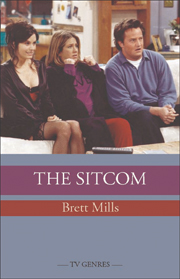6 - The Future
Published online by Cambridge University Press: 05 August 2013
Summary
Vaudeville died, didn't it? Music hall died. And I think we have to be aware of the possibility that sitcom has died.
(Bill Dare 2005)The future of the sitcom may be bleak: received wisdom is that it is a ‘dead’ genre. For example, in 2006 Channel 4 broadcast Who Killed the Sitcom?, an analysis of the genre which gave it a pretty sick bill of health and saw it as a victim of changes in broadcasting, technology and audiences. After all, the recent history of international broadcasting is usually written in terms of the rise of reality television and factual entertainment programming, for such series are cheaper to produce than scripted material, are highly flexible and can run for long periods thus ensuring audience familiarity. Alongside this has been the development of ‘quality’ television drama, whose high production costs are offset by overseas sales and revenues available from DVD box sets. Academic work has responded to these shifts, and a wealth of books has recently been produced covering ‘quality’ drama (Jancovich and Lyons 2003; Hammond and Mazdon 2005; McCabe and Akass 2007; Nelson 2007) and reality television (Bignell 2005; Hill 2007; Holmes and Jermyn 2004); the sitcom, on the other hand, remains a relatively unexamined form. Considering Who Killed the Sitcom? was presented by David Liddiment, a respected director and producer of sitcoms such as Surgical Spirit (ITV, 1989–95) and Up the Garden Path (ITV, 1990–3), the pronouncement that the sitcom is dead can be seen as a fairly incisive indictment from someone inside the industry.
- Type
- Chapter
- Information
- The Sitcom , pp. 124 - 146Publisher: Edinburgh University PressPrint publication year: 2009

